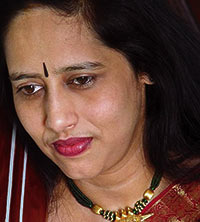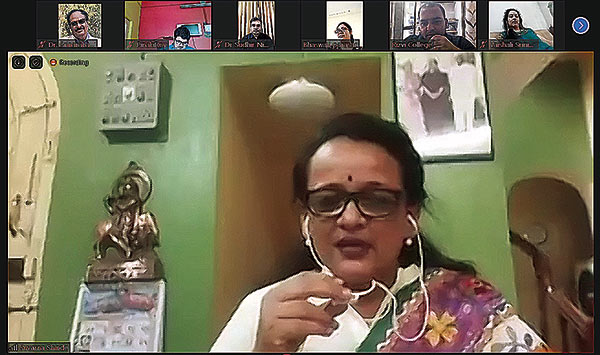SF In India: Webinar on Science Fiction in India

It is universally acknowledged that life is paralyzed due to pandemic spread of COVID-19. The effect encompassed every sector of society, and was not restricted any particular gender, class, age, region, race, religion and others. For the first time, a worldwide pandemic has affected homo sapiens. Every government, voluntary organization, police, military, medical community, and essential service sector must be thanked for their timely, selfless services, which could speed up our recovery and heal the ruptures caused. Science or science fiction could not forecast the devastating effects of the turmoil. Even if these circumstances were hinted at in a few works in the past, humanity could not take them seriously. There is hope and optimism which could revive and restore the formal glory of the past. “After the storm, comes the calm.” Everyone aspires for the return of normal life.
Science fiction must continually progress in order to give us pointers to deal with “Future Shock(s)”, and to encourage scientists and technologists to work hard to find plausible solutions for futuristic problems in order to save generations of humanity. The SF writer with this social responsibility has to constantly study the past, learn by observation and experimentation, and extrapolate into the future. In the midst of the calamities, science fiction people cannot take a break, but must continue with missionary zeal.
The ancient Indian system of education called “Guru Kula,” with learning taking place under the guidance of a learned teacher in his ashram, transitioned to classroom teaching, and has now shifted to online teaching to maintain social distancing. Communication is carried out online in almost all spheres of life. This is a vast change in the way of life due to inevitable circumstances.
A number of creative activities have taken place in India during this lockdown period, including the Marathi Vidnyan Parishad Pune chapter of the Science Fiction Society’s “Home Laboratory Project.”
The National Council for Science and Technology Communication, Department of Science and Technology, and Government of India in association with the Dr. Anamika Ray Memorial Trust has published a multimedia guide with important information on COVID-19 titled COVID KATHA. This was launched by Dr. Harsha Vardhan, the Honorable Union Minister for Health, Science and Technology, on May 3, 2020. A group of enthusiastic Indian SF writers has already planned an anthology of COVID-19 SF stories written on this theme, with Arvind Mishra taking the lead in compiling and editing the volume.
The Rizvi College of Arts, Science and Commerce in Mumbai organized a national webinar on science fiction on May 18, 2020, in collaboration with the Board of Studies in English, University of Mumbai. It was attended by 100 participants. Bhaswati Prasar gave a general introduction about the importance of the webinar and also gave information regarding the people involved in organizing the event. Paul Raj, the principal of the college, welcomed the gathering. He explained how the institution was built with the able leadership of the founder, Aktar Hasan Rizvi, in 1982, with a vision to make education available to all the sectors of the society. The successful story begins with the foundation of Rizvi College of Arts, Commerce and Science in the year 1985. Colleges were also established in Jaunpur and Prayagraj in Uttar Pradesh state in north India. In addition to the academic activities at the national and global level, the principal also highlighted how the college could cater to the needs of the overall development of its students, producing outstanding players in cricket, football, and badminton. In addition, the institution claims to have developed an exemplary digital library.
Sudhir Nikam, the chairperson of the board of studies in English at the University of Mumbai, said the focus of the conference was to expose the student fraternity to the genre of science fiction. He explained how science is inculcated in fiction. Highlighting the growth in the SF market globally with statistics about sales, he said that one book out of 10 sold in the UK, and four out of 10 books sold in the US, are science fiction. He said that literature and science have provided knowledge and power to its users. He said themes of ecology, environment, contact with aliens, alternative history, and space and time have gained momentum in recent years.

Suvarna Shindhe gave a keynote address and quoted past president of India and a rocket scientist APJ Abdul Kalam: “Science is a beautiful gift to humanity, and we should not distort it.” Her scholarly lecture also quoted the views and works of Isaac Asimov, Robert Heinlein, and Theodore Sturgeon. She traced the history of SF from Mary Shelley’s Frankenstein (1818) through Edgar Allan Poe, Jules Verne, George Orwell, and Philip K. Dick. She discussed the difference between SF and fantasy works. She dealt with SF movies, including Artificial Intelligence, Avatar, and PK, and placed Carbon in the top rung of SF movies. She concluded by quoting Wordsworth’s “Lines Written in Early Spring”: “And much it grieved my heart to think, what man has made of man.”
Professor Pinaki Rao delivered a special lecture on “Science Fiction as a Literature,” observing that the lockdown period has treated religion and religious belief as secondary, and has upheld the efforts of scientists and doctors, who are striving hard to find a way out of the crisis. Beginning his speech with the term “Scientifiction” he dealt with history, myth, development, and the latest trends in SF. He cited instances from the works of Sidney Sheldon, described the various forms of future life, discussed characters including R. Daneel Olivaw from Isaac Asimov’s Caves of Steel and Mr. Spock from Star Trek, and later he connected them to mythical references from the Mahabharata and the Ramayana. He also mentioned The Lost World and Jurassic Park by Michael Crichton. He drew the conclusion that SF need not necessarily project into the future, but can also review the past and refer to the present day.
Professor Vaishali, head of the department of English at Bangalore University, Bangalore, Karnataka, delivered a special lecture on “Feminist Science Fiction.” She introduced the basic concepts of feminism and the latest trends, then discussed gender identity, human rights movements, and marginalization issues. Introducing the Indian feminist writings of Shashi Deshponde, she swiftly shifted to focus on the Bangladeshi Muslim SF writer Rokeya Sakhawat Hossain, and her story published in Sultana’s Dreams (1905). It depicts a feminist utopia (called Ladyland) in which women run everything and men are secluded, in a mirror-image of the traditional practice of purdah. The women are aided by “electrical” technology which enables labor-free farming and flying cars; the women scientists have discovered how to harness solar power and control the weather. This results in “a sort of gender-based Planet of the Apes where the roles are reversed and the men are locked away in a technologically advanced future.” There, traditional stereotypes such as men having larger brains or women being naturally weak are countered with logical refutations like, “an elephant also has a bigger and heavier brain” and “a lion is stronger than a man,” but neither dominates men. In Ladyland, crime is eliminated, since men were responsible for all of it. The workday is only two hours long, since men used to waste six hours each day in smoking. The religion is one of love and truth. Purity is held above all, amd the list of “sacred relations” is widely extended. The speaker then discussed the latest trends in feminist SF works by Indian women science fiction writers including Vandana Singh, Meghashri Dalavi, Rekha Baijal, Kalpana Kulshreshta, Sukanya Dutt, Shwetha Taneja, Pragnya Gowtham, Suhashini, and others. Nandita Roy concluded by thanking the collaborators, speakers, and participants for having made the event a grand success.
–M.H. Srinarahari
This report and more like it in the July 2020 issue of Locus.
 While you are here, please take a moment to support Locus with a one-time or recurring donation. We rely on reader donations to keep the magazine and site going, and would like to keep the site paywall free, but WE NEED YOUR FINANCIAL SUPPORT to continue quality coverage of the science fiction and fantasy field.
While you are here, please take a moment to support Locus with a one-time or recurring donation. We rely on reader donations to keep the magazine and site going, and would like to keep the site paywall free, but WE NEED YOUR FINANCIAL SUPPORT to continue quality coverage of the science fiction and fantasy field.







